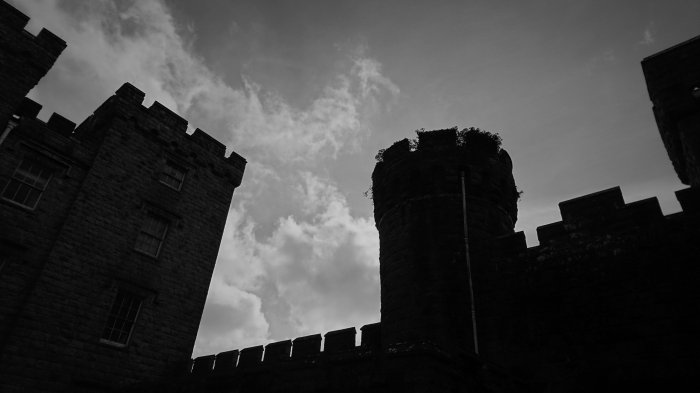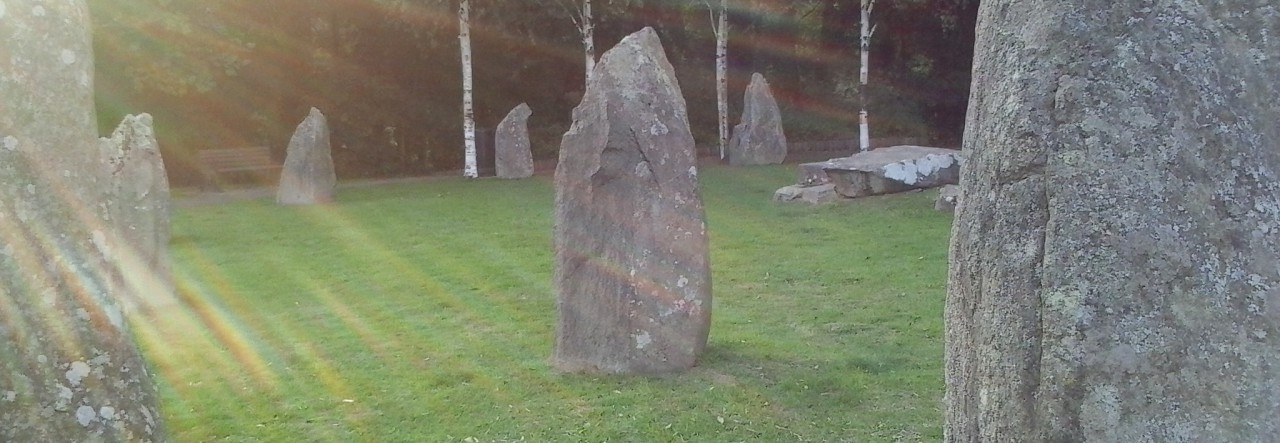
Like many others of my generation I came across King Arthur and his Knights in those simplified retellings with loads of coloured illustrations.
Soon, however, I could see a mismatch between the knights in shining armour and his supposed location in the immediate post-Roman period: how did Roman soldiers morph virtually overnight into paragons of chivalry?
In pursuit of this and similar conundrums I studied history at A-level, attended lectures by Professor Barry Cunliffe at uni, got involved in digs at South Cadbury — a hillfort claimed as the original of Camelot — then a nearby Roman villa, followed by a long-running excavation at an early medieval church site in Wales.* I also edited an amateur journal on and off for nearly forty years exploring Arthurian history, archaeology, fiction and popular culture: Pendragon, the Journal of the Pendragon Society (ISSN 0143 8379).
As a result I have over the years reviewed quite a few Arthurian titles, several of which were added to in this blog. These Arthurian books range from historical and archaeological studies to counterfactual narratives, from literary commentaries to modern fiction, from personages to places and things.
As of 2018, some of my articles for and contributions to Pendragon have started appearing on one of Calmgrove’s sister blogs, Pendragonry — at https://pendragonry.wordpress.com — where you can read and comment on assertions I make with a fine abandon. And from 2023 book reviews** on Arthuriana have started to be transferred from here to the Pendragonry blog.
This will be a good point to declare that I’m agnostic where ‘King Arthur’ is concerned. The conception of a Dark Age warlord that was prevalent and partly (but not universally) accepted in the sixties was one I subscribed to as a possibility then, but the more I study it (and I’ve been doing so for more than 50 years) the more I’m inclined to suspect that the concept is a combination of historical fabrication, paucity of evidence and wishful thinking. That doesn’t make it any less fascinating as a process, which is my apology for continuing to pursue it!
* Schlesinger, A & Walls, C, with J Kissock, C Lovegrove, K Pollard and N Wright. 1995. ‘Excavations at Llanelen, Llanrhidian: an early church and medieval farmstead site.’ Gower, 46, 58-79.
—1996. ‘An early church and medieval farmstead site: excavations at Llanelen, Gower.’ Archaeological Journal,Vol. 153
— Chris Lovegrove
Worthwhile non-fiction titles
Worth consulting, even if well over forty years old: The Quest for Arthur’s Britain **
A seminal work: King Arthur’s Avalon
A reliable overview: King Arthur: Hero and Legend **
Historical and archaeological background to an age in transition: Civitas to Kingdom: British Political Continuity 300-800
Personal items in the Dark Ages: The End of the Western Roman Empire: an archaeological investigation
Literature and texts
Translation of key Arthurian texts: King Arthur in Legend and History
Translations of key texts of ‘mythstory’, including Arthuriana: Myths and Legends of the British Isles
A key medieval Arthurian poet: A Companion to Chrétien de Troyes
Interrogating the documentary evidence: Concepts of Arthur
“Stories I know to be true”: The Lais of Marie de France
Reference
A (nearly) complete compendium of Arthuriana: The New Arthurian Encyclopedia
User-friendly reference: The Encyclopedia of Arthurian Legends
Literary and other texts listed: A Bibliography of Modern Arthuriana **
Arthur’s Celtic origins in context: Dictionary of Celtic Mythology
Armchair travelling: The Traveller’s Guide to Arthurian Britain
More armchair travelling: Arthur’s Britain: the Land and the Legend
Popular culture
The cult of Arthuriana in the Middle Ages: The Medieval Quest for Arthur **
Material evidence for the medieval fascination with the legend: Edward III’s Round Table at Windsor
Victorian fascination with the legend: The Quest for the Grail **
20th-century fascination with the legend: The Oxford Guide to Arthurian Literature and Legend
An accessible introduction to Merlin: Merlin: the Prophet and his History
Pseudohistorical Arthurs
A Scottish Arthur: Arthur and the Lost Kingdoms
A North Walian Arthur: King Arthur: the True Story
A South Walian / Breton Arthur: Journey to Avalon: the Final Discovery of King Arthur
Two Arthurs in Wales: The Holy Kingdom
A West Country Arthur: King Arthur: the Truth behind the Legend
A Central Asian Arthur: Arthur, the Dragon King
A misguided interpretation of Arthur: The Age of Arthur
A king in Dark Age Gaul: The Discovery of King Arthur


Hi,
I followed you back from mine. I’ve reviewed Armitage’s Gawain and the Green Knight and Ackroyd’s Death of Arthur (http://pechorinsjournal.wordpress.com/category/arthurian-myth/) – I’d be interested in your thoughts on both as frankly it sounds like you’re better versed in the myth than I am.
LikeLiked by 1 person
I have reviewed the Armitage book elsewhere, and will have to put a revised version of it online soon! The Ackroyd though I haven’t read as yet, but you’ve got me thinking about them both…
LikeLike
I agree with your pithy summary! What makes me sad, and sometimes cross, is that the hunt for Arthur means that people who lived real lives in hazardous times are brushed aside when any objective analysis should make them ‘heroes’ or at least, influential figures, even though they have the audacity not to be Arthur.
LikeLiked by 1 person
It’s all too true. Especially so, as you’re all too aware, in the case of Cumbria, with its legacy from historical Rheged and all those celebrated names with their fragmented stories from the post-Roman period.
LikeLike
Exactly! I do wish Cumbrian children were brought up on stories of Urien and co, even if plenty of historians aren’t happy about the placement of Rheged.
LikeLiked by 1 person
So do you think it’s spread between Wigtownshire and Cumbria, or more limited than that?
LikeLike
Yes to the first, but I leave it to people who know far more than me to debate the details. If it was easy, we’d all understand it, but it isn’t and we don’t.
LikeLiked by 2 people
Thought you’d be interested: Review in 23-06-13 NYTimes of JRR Tolkien’s “Fall of Arthur” (edited by his son C Tolkien) . An unfinished masterpiece? or a lucky break for LOTR fans?
LikeLiked by 1 person
As I feared, the link didn’t transmit. I’ll try again (but if this doesn’t work, you can search NYTimes website): http://www.nytimes.com/2013/06/23/books/review/the-fall-of-arthur-by-j-r-r-tolkien.html?pagewanted=all
LikeLiked by 1 person
Thanks so much for this link to an thoughtful review, Lizzie. The following statement, that to “write about [Arthur … a Celtic Briton] in the Germanic or Anglo-Saxon verse style of later centuries — that is, in a style brought to Britain by precisely the people Arthur sought to destroy — can only have struck this eminent philologist as an uncomfortable linguistic and historical pastiche” (and presumably also a project that was misconceived), was one that had already struck me when I first saw notices of this. The other reviews I’ve seen have also been largely lukewarm, as with the earlier publication of another of Tolkien’s verse epics, The Legend of Sigurd and Gudrún.
I personally think we should be grateful to Christopher Tolkien for presenting his father’s unpublished work, especially with the copious notes and notations, but expectations that they will necessarily match the work JRR sanctioned for publication in his lifetime are misplaced; the fact that they were abandoned unfinished should be a clear indication that he wasn’t totally satisfied with them, and nor should we expect to be.
So, to answer your I’m sure not wholly rhetorical questions! An unfinished masterpiece? Unfinished, yes, masterpiece, no. A lucky break for LOTR fans? If you mean will it satisfy the hunger of LOTR readers wanting more of the same, I suppose that depends on their capacity to accept that there are no orcs or hobbits. For myself, I’m waiting till the paperback comes out.
LikeLike
By “lucky break”, I meant that it was a lucky thing (for fans) that JRRT dropped it and returned to Middle Earth. On a slightly related note: have you read Arthur Phillips’ The Tragedy of Arthur? It’s only tangentially Arthuriana, but there is the Shakespearean-esque-ish play about King Arthur that all the novel’s hullaballoo is about. Worth the price of admission, I think.
LikeLiked by 1 person
So sorry, Lizzie! I was doing one thing and thinking of another (see, men can multitask too! Only not very well in my case) and mistyped somebody else’s name for yours. Thanks for not minding!
Yes, I see what you meant by lucky break, now you point it out. Crystal clear if only I wasn’t multitasking…
I’ve seen fairly enthusiastic reviews of The Tragedy of Arthur and had it recommended as well, so can’t think why I haven’t chased it up yet. No excuse now not to, so thanks!
LikeLike
It might be late in the day to learn, but it is better to learn late than never and there I found myself looking up the word: agnostic
Thanks chuck, I think I might be quite agnostic myself now I come to think about it.
I aspire to live a natural and kinder life. So kings (including the mythical Arthur), queens (like our current hunting, shooting… cruel to wildlife, head of state) and most powerful people, just don’t interest me much at all, because they’re the ones separated from a natural and kinder life.
LikeLiked by 1 person
Yes, agnostic simply means not knowing enough about something or other — facts or evidence related to it — to give it credence. Arthur, king or not, means such a lot to certain people — as a symbol, as historical fact, as a figure they invest emotion in — that I’ve always felt his reality was worth investigating and, in more recent time, why people had a psychological need for such a figure.
Myself, I’m neither a royalist nor a believer but do see why so many have strong feelings one way or another about his existence and what he stands or even stood for.
LikeLiked by 1 person
Have you read Kazuo Ishiguro’s The Buried Giant? If so, any thoughts?
LikeLiked by 2 people
No, not yet, but I’ve read good reviews of it. Another title on my oh-so-long TBR list! Thanks for the reminder. 🙂
LikeLike
Pingback: Owain Glyndŵr Day – Book Jotter
Oh my, I’ll be returning here again soon. I had a HUGE Arthurian phase in my early-mid 20’s. I had been feeling that old tingle again as I read through all the recent #Dewithon19 posts….and then I spotted this link on your blog…I could be sucked back in again!
LikeLiked by 2 people
Sucked in, I hope, in a nice way! I sort of went off the boil on Arthuriana about ten years ago, Brona, thinking I’d just put past pieces online as a record, but I’m warming to it all again.
LikeLike
Hi, Chris – do you remember me from the Pendragon Society days? Now living in Blaenavon. Finished my PhD on “Jaufre” at Cardiff University last year and now engaged on various fiction-based projects. Still writing, singing and recording songs, and also telling stories (the focus of my “Jaufre” thesis. Would love to re-connect.
LikeLiked by 2 people
I do remember you, Anne — your storytelling (with prompts on slips of paper in various pockets), your music (I believe I reviewed one or two of your CDs) and your excellent and accessible piece on Jaufré! Fantastic news about your PhD.
Yes, do re-connect: my old email ed.pendragon (at) yahoo (dot) co (dot) uk still limps along but I use calmgrove on Twitter, Instagram and gmail if that’s more convenient.
And, weirdly, I couldn’t think why Gentleman Jack’s given name rang a bell, but now I remember!
LikeLike